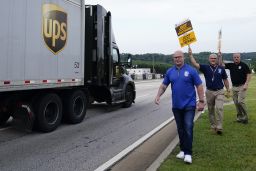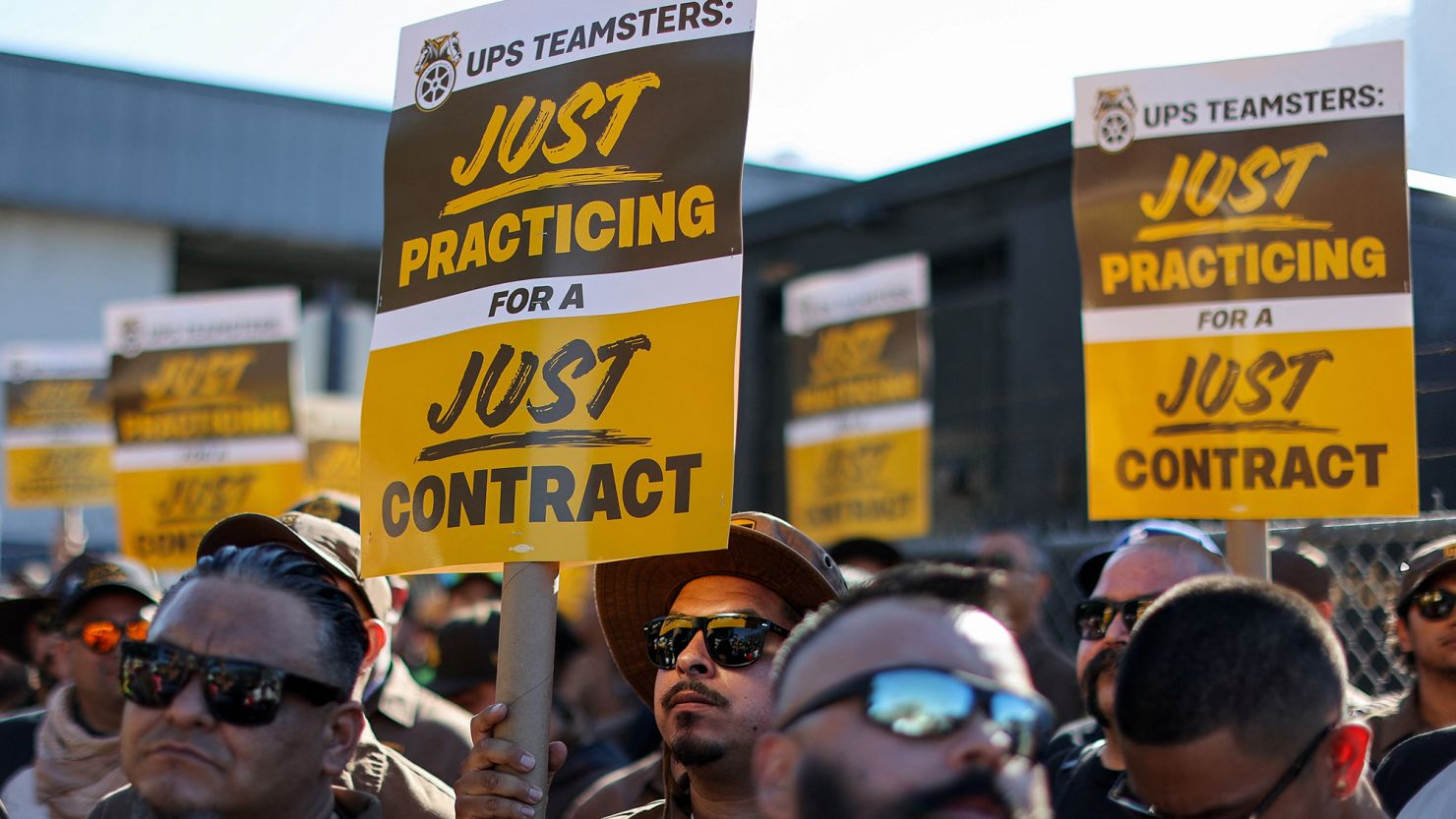UPS and the Teamsters have reached a tentative deal on a new contract, potentially avoiding a strike. A labor stoppage could have started as soon as next week and crippled US supply chains and been a multi-billion dollar hit to the economy.
“We’ve changed the game, battling it out day and night to make sure our members won an agreement that pays strong wages, rewards their labor, and doesn’t require a single concession,” said Teamsters President Sean O’Brien in a statement. “This contract sets a new standard in the labor movement and raises the bar for all workers.”
The deal comes as the American labor movement has grown increasingly energized and empowered. The pandemic sent lower- and middle-class US workers’ pay surging for the first time in decades, but contract workers missed out on much of those gains. That’s why unionized actors, writers, nurses and teachers have recently gone on strike, and UPS workers and autoworkers have threatened walkouts.
“Together we reached a win-win-win agreement on the issues that are important to Teamsters leadership, our employees and to UPS and our customers,” UPS CEO Carol Tomé said in the statement. “This agreement continues to reward UPS’s full- and part-time employees with industry-leading pay and benefits while retaining the flexibility we need to stay competitive, serve our customers and keep our business strong.”

The tentative agreement still needs to be ratified by about 340,000 Teamsters at UPS to end the threat of a strike altogether. That ratification process will take a little more than three weeks. A no vote by membership could still trigger a strike, but that walkout would now take place in late August, not the original August 1 strike deadline.
“It’s very hopeful,” said Ryan Boyd, a part-time UPS worker, at a Teamsters union hall in Philadelphia on Tuesday. “I think if the tentative agreement is consistent with the terms The Teamsters have laid out over the last few months then I think this is really going be a historic agreement that is beneficial not just for UPS workers but workers in the industry and workers in general.”
UPS handled an average of 20.8 million packages a day last year, and while there is some excess capacity at FedEx, the US Postal Service and Amazon’s own delivery service, few thought all the packages could be handled through those alternatives had there been a strike.
President Joe Biden hailed the tentative deal. “This agreement is a testament to the power of employers and employees coming together to work out their differences at the bargaining table in a manner that helps businesses succeed while helping workers secure pay and benefits they can raise a family on and retire with dignity and respect,” he said in a statement.
Acting Labor Secretary Julie Su told CNN Tuesday the Biden administration did not intervene or participate in labor negotiations between UPS and the Teamsters.
“No, the parties make this agreement on their own– and I think that’s an important thing,” Su told CNN’s Boris Sanchez in an interview from the White House.
Among the issues in the contract negotiations were air conditioning for delivery vans, demands for significantly greater pay, especially for part-time workers, and the closing of pay gaps between two different classes of UPS workers.
Contract negotiations
The two sides had previously reached agreement on about 95% of the contract, according to O’Brien, but talks broke down on July 5 over economic issues. Heading into the talks on Tuesday the focus was on pay and benefits for part-time workers, who make up more than half of Teamsters at the company. Once the talks resumed Tuesday morning the two sides quickly reached the tentative agreement.
Many details of the tentative agreement are not yet public. But the union said that existing full- and part-time UPS Teamsters will get $2.75 more per hour in 2023, and $7.50 more per hour, or more than $15,000 a year, over the length of the contract.
Existing part-time workers,who the union said were making as little as $15.50 an hour as starting pay in some parts of the country, will be raised up to no less than $21 per hour immediately, and starting pay would be increased to $23 an hour during the life of the contract.
The company said that part-timers were already averaging more than $20 an hour before this deal and that their benefits included many that part-timers at most other companies do not get, including premium-free health insurance, pension and tuition reimbursement.
The company risked losing customers long-term from even a short strike, as many major shippers might have signed long-term contracts with UPS rivals such as FedEx in order to keep their packages moving. Satish Jindel, president of ShipMatrix, a software provider that works with parcel shippers, had estimated that UPS might get back only 70% of its normal business if a strike had taken place.
Strike could still happen
But the threat of a strike is not over. There is still lingering anger among many Teamsters, and even with the increases in pay and other wins at the bargaining table membership could vote down this deal.
“The company saw profits soar during the pandemic on the work of members, who worked a lot of mandatory overtime,” said Todd Vachon, professor of labor studies at Rutgers University. “There’s a lot of frustration and I’m not sure they’re going to ratify a contract on the first round, regardless of what’s in it.”
There will be relief among some members over not having to go on strike. UPS has not had a strike since 1997, so most of the 340,000 Teamsters at UPS have never been on strike during their time at the company.
Carl Morton, a UPS driver, said he was thrilled by the news of the deal, that he was ready to go on strike if it happened, but was hoping it wouldn’t happen.
“It’s like an instant relief,” he told CNN at the union hall in Philadelphia. “It’s crazy. Um, just minutes ago we thought he was going on strike and now everything is settled just essentially.”
Still, there have been numerous examples of those ratification votes failing, despite the deal being endorsed by union leadership.
One of those votes came this week, when 57% of the pilots union at FedEx voted down a tentative contract agreement that would have increased their pay 30%. Because of the labor law that applies to airline pilots, that union is not allowed to go on strike any time soon, despite the no vote.
But those limits don’t apply to the Teamsters at UPS. And they haven’t applied to other unions where rank-and-file members went on strike, despite lucrative deals endorsed by their union leadership.
Members of the United Auto Workers union at agricultural equipment maker John Deere voted down a deal and went on strike in October of 2021, and then voted down a subsequent deal and stayed on strike, before finally accepting a third deal to end the five-week walk-out. And many of the freight railroad unions rejected deals that their union leadership had negotiated last year, even though the same limits that applied to FedEx pilots prevented them from going on strike.
In 2018 a majority of Teamsters voted against ratifying the current contract with UPS, which included the two-tier wage scale for the first time. But because a majority of the union did not participate in the ratification vote, the contract was imposed on them anyway, which angered members. The Teamsters have since changed the rule, and a “no” vote in the ratification process would now result in a strike, no matter how many participated.
O’Brien made his opposition to that contract the major issue in his election campaign. O’Brien told CNN earlier this year that he was confident a tentative union deal would be ratified. But he said that members are angry with UPS, particularly because a number of other companies, including non-union FedEx, increased pay for workers during the pandemic.
“There is a lot a lot of animosity and anger not just during the last contract but what happened during the pandemic,” O’Brien told CNN in June. “They weren’t rewarded as UPS made record profits.”
Spurred on by a surge of online shopping during the pandemic, UPS posted 2022 profits of $11.3 billion, nearly doubling to repeated record levels during the current five-year contract.
The Teamsters said the deal will cost UPS about $30 billion in additional spending during the life of the five-year life of the contract. UPS would not comment on that estimate, but it said it would be detailing its own estimate of the cost when it reports second quarter earnings on August 8.
Shares of UPS were down 1.5% in afternoon trading.








